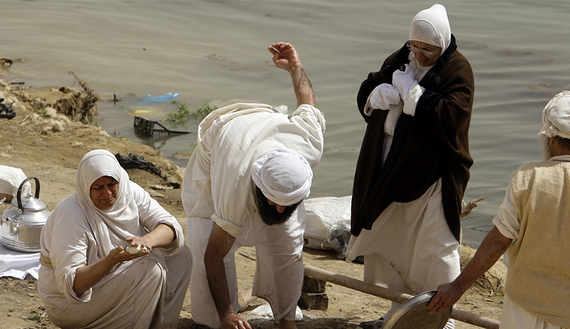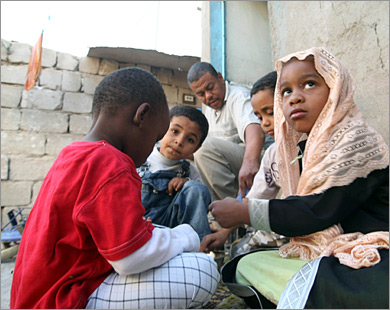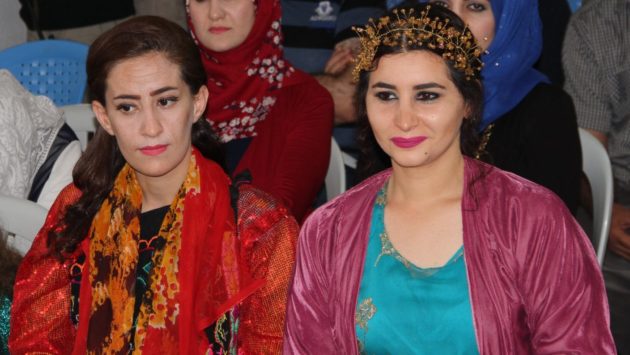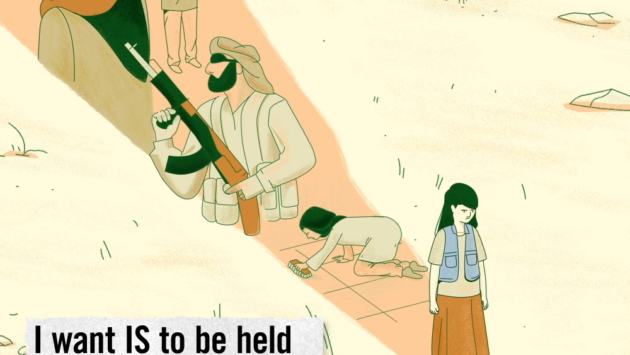What will happen to Iraq’s Mandaeans?

By Saad Salloum – Al monitor – Jan 19, 2016.
BAGHDAD — Unlike other religious minorities in Iraq, Sabian Mandaeans meet their election quota by selecting members within their community for parliament and provincial councils.
The community’s three bodies — the Spiritual Council, General Assembly and General Affairs Council — supervise and nominate Mandaeans for senior positions in Iraqi state institutions. A candidate’s name is then submitted in a letter from the community to the institution concerned, such as the Electoral Commission, parliament or presidency.
Through this democratic mechanism, the Mandaeans have tried to prevent major political currents from dominating the minority parties or using the minority representatives to their advantage in parliamentary voting. Yet at times these currents have wielded their influence to manipulate the process so that their supporters are nominated. Of course, the Mandaeans consider this a denial of their rights.
Al-Monitor interviewed Nadia F. Maghamiss of the Divan for Endowments of the Christian, Yazidi and Sabian Mandaean Religions. The prime minister appointed her as acting general director of Sabian Mandaean affairs for the Council of Ministers-affiliated divan.
The text of the interview follows:
Al-Monitor: How do you describe the fact that a woman from a minority community was appointed acting general director at the divan?
Maghamiss: It is a great challenge at the divan, the state institutions and the Mandaean community. First, it is not easy for a person from a minority community to hold the post of general manager under the quota system and dominance of major political parties. The difficulty is double, because I am a member of a small minority compared to the number of Christians and Yazidis, which is the Mandaean. Second, being a woman of a minority community made my accession to the post more difficult, given the quota system at the Christian, Yazidi and Sabian Mandaean Endowments Divan, since it is a state institution. Although the internal regulations of the divan stipulate that religious communities should be represented regardless of the number of adherents, the representation in the divan took into account the numeral criteria rather than the equal representation among religious communities.
Al-Monitor: How were you nominated by the Mandaean community for this post?
Maghamiss: It was a unique event in the Mandaean community. The three councils of the community’s internal system — namely the Spiritual Council, the General Assembly and the General Affairs Council — have made the decision that any nomination to a high post in the Iraqi state institution should take place through elections within the community, in the presence of members of the community’s three councils. Then the candidate’s name will be submitted in a letter from the community to the state departments. The candidate must have half plus one of the votes at the general assembly in order to be nominated. The members of the general assembly are the only ones entitled to vote among the three councils of the Sabian community. [The General Assembly] is similar to a parliament and is responsible for the enactment of laws according to the community’s internal regulations. I won half plus six of the votes during the elections that were held in the Mandaeism Mandi [place of worship for Sabian Mandaean community; the main mandi is in Baghdad’s al-Qadisiyah neighborhood] on March 11, 2014.
Al-Monitor: Is your nomination considered an unprecedented event in the community?
Maghamiss: The Sabian Mandaean community has never nominated a woman for any important post in the state institutions. Historically, a woman never held the post of general manager of any of the communities’ endowment affairs, be it Muslim, Christian, Yazidi or other, in the contemporary history of the Iraqi state. This post was reserved for men only. I appreciate the big responsibility of representing women and my religious community, which is incumbent upon me. I succeeded in convincing them to have access and manage this post to the fullest. I took office as acting general director [this position requires the approval of the Iraqi prime minister exclusively] on Sept. 17, 2014, as a [successor] to Toma Zahroon.
Al-Monitor: Do you have remarks on the Sabian Mandaean community representation in the state institutions?
Maghamiss: Sectarianism, the quota system, the many political parties and the distribution of posts among themselves have caused our representation to be ineffective. The Sabian seat in [Iraq’s] parliament can be taken away by powerful parties. In other words, although this seat is for a Sabian Mandaean member of parliament, it may fall under the influence of the Shiite or Kurdish political currents, and thus, the Mandaean community will lose this privilege [choosing their representative] in the Baghdad council. Major political parties request their followers to vote for a candidate of a certain minority so that this person receives enough votes to reach the threshold of the quota — although he had not been chosen based on the will of the sect or according to [the sect’s] internal elections.
The same applies to our representation in the Baghdad provincial council. The political representation of the minorities is symbolic and ineffective in all cases.
Al-Monitor: Does the Mandaeans’ representation in the divan fulfill the Mandaeans’ ambitions and express their aspirations?
Maghamiss: The Christian, Yazidi and Sabian Mandaean Endowments Divan is a small state institution, although it concerns the three religious communities that are acknowledged in constitutional Article 2-2. Yet in the divan, dealing with the three religious minorities that are officially recognized is based on the number of adherents rather than their competence. There are seven general directors, two vice presidents and one president of the divan, of which the Mandaeans only obtained the post of general director of the Sabians’ endowment affairs, or rather acting general director, and one vice president of the divan. So far, we have not gotten the Cabinet’s approval on these posts, although more than a year has passed since [the letter] was submitted for approval. This means that it is not our right to compete for the post of president of the three religious communities’ endowments divan, due to our small number compared with the Christians and Yazidis.
Al-Monitor: What is the nature of your job at the Christian, Yazidi and Sabian Mandaean Endowments Divan?
Maghamiss: I use my experience as an architectural engineer at the divan to serve its projects, as I provide engineering consultancy services. I have chaired several committees such as the Christian, Yazidi and Sabian Mandaean women’s affairs follow-up committee, the high committee for the advancement of women with the canceled Ministry of Women’s Affairs, the High Committee for Literacy with the Ministry of Education and I was a member of the adjudicating committee in the divan, in charge of making important decisions.
My duties as the acting general director of the divan include following up on Sabian religious affairs and endowments, including real estate properties, acquisitions and architectural designs and monitoring the implementation of the sect’s related projects such as the construction of Mandaean places of worship [mandis], cemeteries, guest houses, schools and other buildings in Baghdad and the provinces.
I am also tasked with communicating with the representatives of other religions, by participating in meetings, conferences and festivals and by exchanging visits and visiting religious figures and authorities and diplomatic bodies to cater to the needs of adherents of the three religions in the divan.
Al-Monitor: What are the main obstacles that hinder your work?
Maghamiss: We mainly suffer from a lack of financial allocations to the divan. How can we introduce our religion to Iraqis and to the world in light of no allocations to print publications on our beliefs and produce movies and documentaries? The official media does not contribute in any way in introducing our religion. We have almost become an unknown religion.
Is it possible for the Mandaean sect not to be able to print its holy scriptures, such as the Ginza Rba, due to lack of financial allocations? Mandaean clerics are the poorest clerics among religious sects [in Iraq] because they are fully dedicated to religious affairs and have no financial resources or salaries by the government.
Mandaeans do not have any properties or investments that generate funds, such as the Islamic or Christian endowments. Mandaean clerics do not receive any paychecks from the government as is the case of Muslim clerics who are in charge of supervising mosques and Husseiniya councils. Moreover, Shiite clerics, for instance, receive religious donations known as khums. But there are no Mandaean wealthy traders to make such donations to this small community, as most of them left Iraq. We are a forgotten sect in Iraq and are on the verge of extinction.
Al-Monitor: Do you feel there is discrimination against Mandaeans on the official level?
Maghamiss: Mandaeans complain of a discriminatory preferential treatment regarding the construction of places of worship. While it is easy for Muslims to build a mosque or a Shiite shrine, constructing a mandi requires cumbersome administrative measures and prior approvals.
Mandaeans have no place to perform their rituals in numerous regions [in Iraq], especially in al-Qurnah in Basra province, in Kut, which is the center of Wasit province, and in Sawira in Wasit province. A large number of Mandaean families reside in these regions [there are no official statistics whether from Mandaeans or the state]. There is an urgent need for constructing mandis to allow the Mandaean population to practice their religious rituals, especially in light of the scarce financial resources of this sect and the lack of sufficient financial allocations in Iraq’s budget to the divan to allow it to acquire real estates and build mandis.
Mandaeans also complain of a discriminatory preferential treatment on another level, related to the investment of their endowments and properties. While it is permissible for Muslim endowments by the Ministry of Planning to invest their lands in projects, such as using them as parking spaces, building hotels, playgrounds and other projects, Mandaeans are not allowed to construct guest houses or religious schools or even residence complexes for their clergy. The Mandaeans are even not allowed to invest in projects of public interest, such as the construction of a hospital, for example.
Al-Monitor: What are your current and future personal ambitions?
Maghamiss: I want to fulfill the Mandaeans’ needs. They need to have a place of worship, an administration complex, guest houses, schools and cultural buildings in the provinces where they reside, such as the provinces of Maysan, Basra, Qadisiyah and Dhi Qar. My political ambition is to represent the Mandaeans at a higher level. I want the Mandaeans to have a member of the parliament or a minister. My experience in engineering may be put to use in the Ministry of Housing and Construction, the Ministry of Municipalities [and Public Works] and the secretariat of Baghdad. This is how I will seek to serve my country.
Al-Monitor: What do you want to offer to the women of religious minorities?
Maghamiss: I was tasked with the follow-up on the affairs of women of the three religions at the divan. I found that there is an overwhelming mission in this respect, which is to address discrimination against the women of these religious minorities — Christians, Mandaeans and Yazidis — and even against Muslim women who suffered from the scourge of war and the sectarian conflict between Sunnis and Shiites. Women are the most vulnerable segment; if a woman’s husband or father is killed in the Sunni-Shiite conflict, she is left alone to provide for her family.
The enslavement of Yazidi women by Daesh is a catastrophe on all levels, and yet we stand idly by, unable to free these women detained by Daesh. Planning to preserve women’s dignity is an integral part of our work in the follow-up committee on women, such as paying ransoms to free those kidnapped by Daesh or at least offer a shelter to the Yazidi survivors.
Once again I confirm that the crippling lack of financial allocations prevents us from taking any efficient step.
Al-Monitor: In light of the foregoing, are you practically unable to help women from religious minorities in general, and Yazidi women who were liberated from Daesh in particular?
Maghamiss: The lack of financial allocations and the ensuing halt of the endowments projects will not discourage us from continuing our work. We have been exerting all possible efforts. We had no other choice than taking action. For example, the divan has set on its list of our priorities building a camp for the Yazidi women who survived enslavement by Daesh as well as displaced Yazidi women with their children. I went on a field visit on Dec 1, 2015, to Sheikhan, an area where the divan had built a camp near the Yazidi sacred Lalish temple.
The project cost 2.6 billion Iraqi dinars [$2.3 million], and it was assigned to a local contracting company. We are hoping to get the allocations from the Iraqi government in the future to pay the contractor’s financial dues [deferred payment]. By virtue of my work as responsible for women’s affairs in the divan, I inspected the project and followed up on it by conducting a field visit. I also urged the contractor to complete the project and followed up on his needs. Together [with the contractor], we set a time limit to finish the project, not exceeding three months, however this period may be extended for two months for the completion of additional works that I am directly in charge of. This is the best we can do under the current circumstances.




